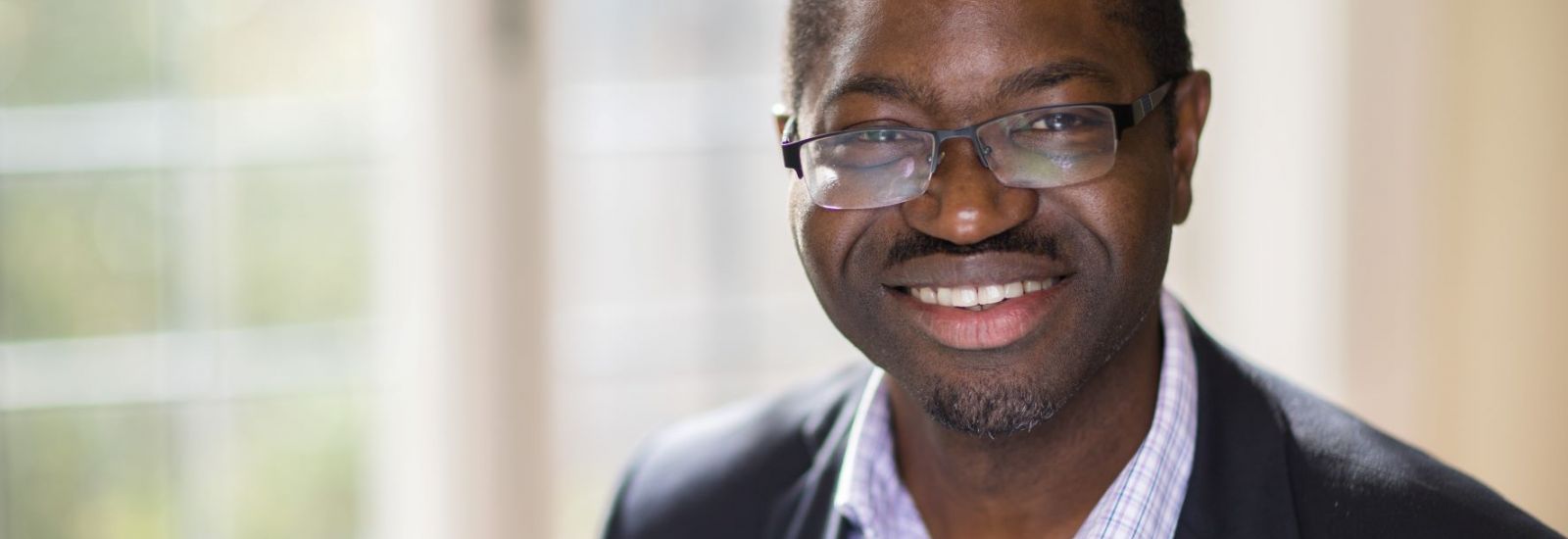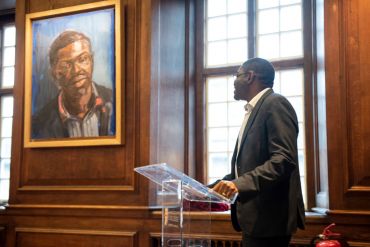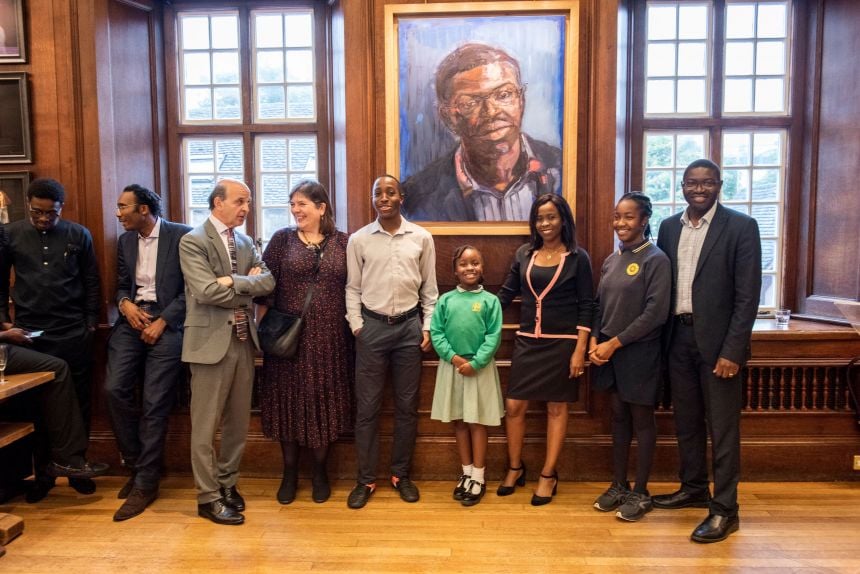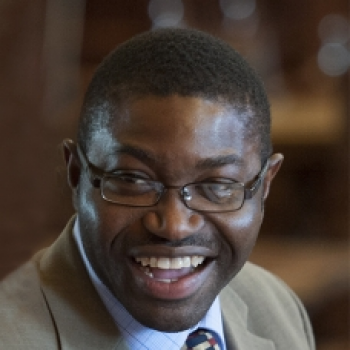
Professor Dapo Akande, the very genial new UN law expert, talks genocide, mass murder...and Oxford
In a city of impressive individuals, Professor Dapo Akande is extremely impressive – and extremely nice; a winning combination. The Oxford law professor is sought globally for his legal opinions, in particular on human rights and war crimes, an area in which he has specialised. And two weeks ago [12 Nov] he was elected, by a vote in the UN General Assembly, as a new member of the International Law Commission. But visit his office and you could encounter the dean of a prestigious US law school, who had dropped in for a chat and is bestowing evidently fond farewells. And Professor Akande will apologise profusely for keeping you, as though he had been waiting all his life for this appointment and does not wish to waste your time.
Truth is, Professor Akande is a very busy man and it is his time which is being wasted, although he is far too polite to say so. Among his many roles, he is Professor of Public International Law at Oxford’s Blavatnik School of Government; co-director of the Oxford Institute for Ethics, Law and Armed Conflict; a ludicrously prolific author; an adviser to governments and international bodies and a consultant, counsel and advocate on cases before the International Court of Justice. And that was before the ILC election.
As a measure of how Olympian this height is, the members of the International Law Commission do not receive anything so grubby as a salary.
A seat on the ILC is, perhaps, the pinnacle for an academic lawyer. There are just 34 members on the Commission, and places are hotly-contested. Fifty stood for this election. Professor Akande was nominated by the UK and Nigeria, his country of birth, and also by Kenya, Japan and Slovenia. But, along with all ILC members, the professor will act independently as a member of the Commission - a legal expert rather than an advocate for his nominators. As a measure of how Olympian this height is, the members do not receive anything so grubby as a salary. They undertake the work entirely for the love of it.
And Professor Akande clearly does love it – and always has – as dozens of journal articles, internet publications and book chapters testify. Speaking before his election, he talked with excitement about the range of legal issues a place on the ILC involves and the honour it was for him to be nominated. His interest in academic law goes back a long way – all the way to his undergraduate studies in Nigeria.
I was not very keen on science...I liked the humanities, history and politics especially, and sports. I liked everything: football, volleyball and basketball, but I wasn’t tall enough for that....I was a very argumentative kid and it seemed a good idea to study law at university
‘Both my parents were academics, scientists – a Medical Doctor and a Zoologist. From the word go, I was not going to follow in their footsteps,’ he laughs. ‘But, from early on, I wanted to be an academic lawyer.’
‘I was not very keen on science,’ he explains. ‘I liked the humanities, history and politics especially, and sports. I liked everything: football, volleyball and basketball, but I wasn’t tall enough for that.’
He smiles, ‘I was a very argumentative kid and it seemed a good idea to study law at university.’
Professor Akande adds, ‘Most people in Nigeria want to study for a professional vocation – so they can be a doctor or an engineer, a lawyer or maybe an accountant. And I was interested in law, it wasn’t foisted on me.’
But he never saw himself, as a high-paid, high-powered barrister or solicitor. While doing his first degree in law, he knew he wanted to follow the academic route.
‘I was interested in the practical application of law,’ he said. ‘But I knew what I wanted to do – academic law brought together a lot of my interests.’
 Professor Dapo Akande at the unveiling of his portrait in St Peter's College.
Professor Dapo Akande at the unveiling of his portrait in St Peter's College.‘I had some excellent mentors,’ he says. ‘Dame Rosalyn Higgins [former president of the International Court of Justice] and Sir Daniel Bethlehem [a renowned international lawyer] were very encouraging.’
His university studies coincided almost exactly with a changing world and a new focus on international law. And working with the two eminent lawyers at the LSE put the student Akande on the path which was to lead to the ILC.
In many ways, the break-up of the Soviet Union, and its aftermath ushered in a golden age for international law – and for a keen young international lawyer. The conflict in the former Yugoslavia and the first gulf war were turning points...the international legal framework...had been deadlocked in a Cold War Security Council
Professor Akande says, the 1990s was a time of fast-moving issues in the world of international law, as the global order appeared to be breaking down and conflicts spread around the world. The huge issues of human rights, aggressive war and ultimate oversight of the international community had been resurrected. It led to a lifelong interest and commitment, he says, ‘I delved into law of international organisations, international criminal law, dispute settlement and international economic law. I was interested in most areas of international law.’
Professor Akande worked on projects with his mentors and was already very much part of the academic legal world. With some practical experience already under his belt, the young Akande was already being published in top law journals – on critical matters of international justice - although still studying for a PhD (at Cambridge).
Boundaries were being pushed for the legal community. In many ways, the break-up of the Soviet Union, and its aftermath ushered in a golden age for international law – and for a keen young international lawyer. The conflict in the former Yugoslavia and the first gulf war were turning points in the international legal framework, which for so long had been deadlocked in a Cold War Security Council.
With articles appearing and so much happening in the field, he went to take up his first teaching post – at the University of Nottingham. From there he went to Durham and from there he came to Oxford in 2004. Then on to the US, Yale Law School (hence the former dean’s appearance) and then back to Oxford in 2009.
‘There seemed nothing, at that time, that the UN could not do,’ says Professor Akande, talking earnestly of the decisions taken by the Security Council, in respect of war in Iraq, and the situation in the former Yugoslavia. Although the rule of law was welcomed, it was also problematic, says Professor Akande.
But by the mid-90s, there were worries about whether there were any constraints [on the Security Council]...Was it becoming a world government? What were the limits?
‘But by the mid-90s, there were worries about whether there were any constraints,’ he says. ‘Was it becoming a world government? What were the limits?’
The rule of law between countries was thrown into sharper focus, by the shift in geo-politics, and there was a rush to fill the vacuum with international law.
‘You need a framework in international law,’ insists Professor Akande. Rules and laws benefit countries and only cooperation can bring order, he says, ‘It’s in everyone’s interests.’
There has been a change in attitudes to international law in the subsequent years. It comes and goes in terms of popularity, he says.
After the Second World War, there was ‘enthusiasm’ for international law – a determination for rules to be developed and for the world not to go through this again. The International Criminal Court was built on the legacy of Nuremburg, he explains, where some leading Nazis were held accountable for their actions and pleaded the ‘I was only following orders’ defence.
The International Criminal Court was built on the legacy of Nuremburg...where leading Nazis were held accountable...and pleaded the ‘I was only following orders’ defence...But many of the same issues remain today...70 years after Nuremburg
But many of the same issues remain today, 70 years after Nuremburg, with questions remaining over aggressive war and the jurisdiction of domestic and international courts to prosecute senior state officials for international crimes.
Over the last three decades, Professor Akande has written extensively on the burning issues of international law, thrown up by conflict. From the ‘crime’ of aggression to proportionality in self-defence from the immunity of officials to the role of the Security Council, and the international courts, the professor has been a key voice as international law once more came into the spotlight.
‘After the second world war, it was thought we had to use the lessons from the war,’ he says. But then came a period of retrenchment, during the Cold War, which was marked by mutual suspicion and a lack of international trust. There was not seen to be much advantage in creating new institutions and rules, so the system went into reverse.’
And so did cooperation. Professor Akande says, from the 1990s, we went through another cycle in which international law has developed. But, right now, he maintains, as the situation has changed again. we are going through a period in which international law is being set aside by countries, believing it is in their national interests.
Speaking well ahead of COP26 and in the shadow of the pandemic, he says, ‘States are not as keen on international treaties as they were. Some states have withdrawn from the international criminal court...international trade law has effectively been undermined.’
Many states are suspicious of international law – seeing it as an imposition, a loss of sovereignty or even an attempt by the global North to control other countries. Professor Akande says, ‘Even if international law doesn’t function as we would like it to function...it still brings benefits. There may be concerns about giving away sovereignty, but it is not a case of giving away something when you could not do it on your own.’
But, he insists, ‘States need to see that rules benefit them and at moments of crisis we need to cooperate. There’s a lot of uncertainty.’
Don’t countries just act in their own national interests?
‘Everyone seeks to promote their own interests but also seek an agreement, one that has advantages and a lot of the time, just having an agreement is beneficial,’ he maintains.
 Dapo Akande, right, with his family and colleagues at the unveiling of a new portrait at his former college, St Peter's.
Dapo Akande, right, with his family and colleagues at the unveiling of a new portrait at his former college, St Peter's. The International Criminal Court is a great success for the international community, according to Professor Akande. But it was not without critics. At one point, the only cases brought before the court, for war-related crimes, were those involving African states.
‘It could be seen as imposing rules on Africa and not elsewhere,’ he agrees. But, he says, ‘The victims were also Africans.’
But, such issues can lead to a loss of faith in institutions and the benefits of international cooperation can appear ‘less real’, he said. ‘International tribunals are under stress, the ICC, the WTO and the ECHR (European Commission on Human Rights) but there are more courts and tribunals than ever and they are busier than ever.’
It is a critical point for the ILC, and its newest member. With attitudes hardening internationally and many crimes still not properly codified, he is under no illusions about the difficulties and challenges ahead. But, he says with unaffected enthusiasm, ‘It’s a unique opportunity to make a contribution to international law. One of the main functions of international law is the provide predictability and stability in inter-state relations but it can only do this if the rules of international law are clear and clearly articulated.
'This is where the ILC comes in with its mandate of codifying international law. The other aspect of its mandate is the progressive development of international law and this simply means seeking to ensure that the rules of international law are fit for purpose.’
Genocide, he says, is a very specific crime, dealing with the ‘intention to destroy a racial, ethnic or religious group’. It does not cover many of the most heinous crimes...of mass murder and ethnic cleansing. For that, says Professor Akande, agreement is needed on ‘crimes against humanity’
He explains, the ILC has prepared a draft treaty on crimes against humanity, which could provide a legal basis for action internationally and in domestic courts. Although the word genocide is often bandied about, Professor Akande says, many terrible events are not genocide, which is a very particular crime.
Genocide, he says, is a very specific crime, dealing with the ‘intention to destroy a racial, ethnic or religious group’. It does not cover many of the most heinous crimes of recent wars, of mass murder and ethnic cleansing. For that, says Professor Akande, agreement is needed on ‘crimes against humanity’.
‘An international treaty on crimes against humanity, could have broader applications,’ he says. ‘It could be a good basis for a code of international law...the ILC work needs to be taken up by states....the real work gets done in the domestic courts but it would provide a framework and an obligation on states to prosecute.’
The ILC is also engaged in related work of examining the ability of domestic courts to exercise criminal jurisdiction over the officials of foreign states.
Another important issue currently on the agenda of the ILC is an examination of how international law responds sea level rise. In particular, it is examining the impact of sea level rise on maritime boundaries of affected states, on migration and even on the very ability of island communities, say in the pacific, to continue as states if their islands become totally submerged.
 The genial new UN legal expert
The genial new UN legal expert‘What’s not to like?’ he says enthusiastically. ‘I don’t think I’ve lived anywhere for as long as I have lived in Oxford. It’s a cosmopolitan environment but it’s relatively small. I like small, it’s liveable. The whole world is in Oxford. It’s just wonderful.’
And with that, the very modest new ILC member turns to apologise profusely to a grad student, who has been outside his office for at least five minutes.
By Sarah Whitebloom